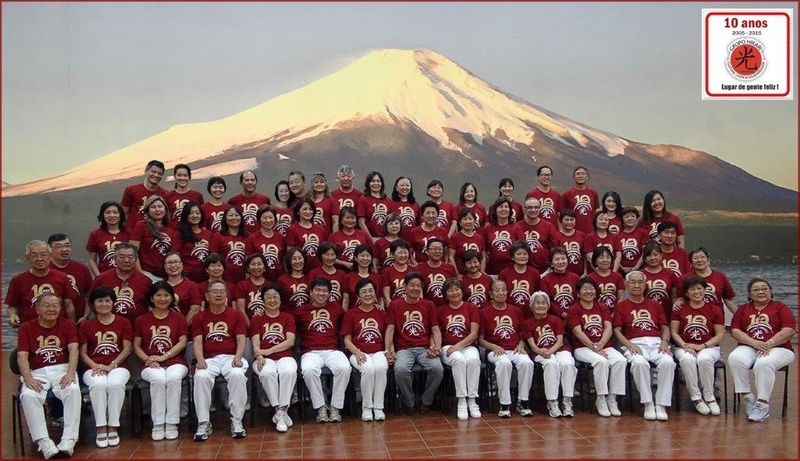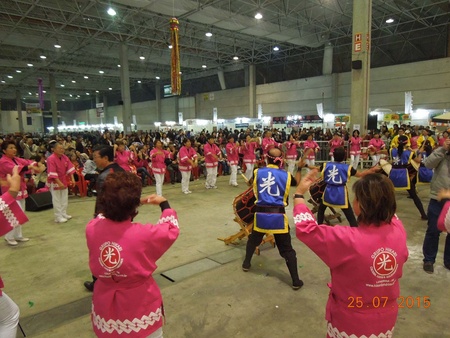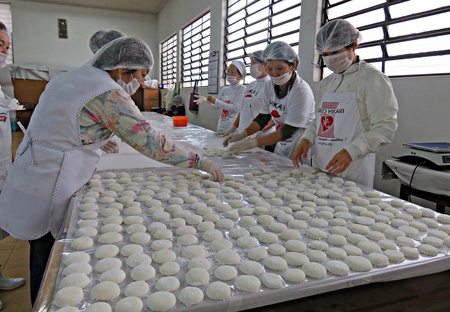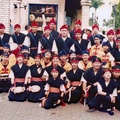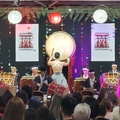Londrina, a city in the north of the state of Paraná, is the second community with the largest number of Japanese descendants in Brazil, with around 30 thousand Nikkei , being one of the largest in the world outside of Japan. It is there where the Hikari Group emerged and operates , which turns 10 this year.
How the group was created
Former members of the youth group from the Nishi Hongwanji Buddhist Temple in Londrina who had been away for more than 30 years mobilized in 2003 to create an association of friends to train bon odori . This was a tradition brought by immigrants, who danced bon odori in ceremonies held in Buddhist temples to revere the spirit of their ancestors.
The idea arose for several reasons, such as the arrival of immigrants and their descendants to work in Japan as dekasseguis from the 1980s onwards and the increasing decrease in participants in Buddhist church ceremonies in the city. The group was created by Irene and Luiz Kuromoto and created in 2005 and, the following year, was named Grupo Hikari (“shine, light”, in Japanese).
Its objectives are: to contribute to the dissemination of Japanese culture by keeping the tradition of bon odori alive, to collaborate with philanthropic entities that support the elderly and children, to encourage integration, teamwork and to strengthen friendship and the quality of life of members. .
Today there are 73 participants with different professions, students, retirees, descendants and non-descendants of Japanese people of all ages. In addition, the group has around 60 volunteers for administrative activities, promotion and dance workshops in other cities.
Activities and presentations
Every week, the members participate in paid training in bon odori and matsuri dance choreography (a more modern version of bon odori , popular among young people).
During the year, the group promotes workshops to train and teach choreography and performs at events related to the Nikkei community, mainly in Paraná and São Paulo, where the largest number of immigrants and their descendants in Brazil are concentrated.
Since 2006, it has organized the Odori Fest, its main event, in November, at the headquarters of the EMBRAPA Employees Association, in Londrina. The decoration features tyotins (paper folds that are a type of lamp) and cherry blossoms, made by volunteers and which, according to tradition, attract good fluids and harmonize the environment.
The highlight of the festival is the “rain of moti ” ( ame moti ), in which approximately ten thousand individually wrapped mini motis (rice dumplings) are released to the public as a symbol of peace, joy and happiness.
Every year, the Hikari Group holds motitsuki to preserve the tradition of preparing and tasting moti brought to Brazil by Japanese immigrants. The rice is cooked, then pounded in a suitable machine (in the past, a pestle was used) and, when it reaches the appropriate consistency, dumplings are made. This activity has brought together members, family and friends who take turns performing different tasks from production to sales.
Since 2010, the group has participated in the Festival Paranaense de Bon Odori, promoted by the Brazil-Japan Cultural Alliance of Paraná. Held annually, each edition of the party takes place in one of the cities affiliated to the entity in Paraná.
Hikari has also participated in the cultural program of the Japan Festival in São Paulo since 2011. This event, one of the largest in Latin America, aims to promote Japanese culture and transmit traditions and customs to new generations.
In 2008, he was present at the celebrations of the 100th anniversary of Japanese Immigration in Brazil and, when there is an opportunity, he teaches workshops on making tyotins , used to decorate bon odori festivals.
Help others
In 2011, the group was honored by the Londrina City Council with the Public Recognition Diploma for the relevance of the services provided to the community. In addition to holding its own events, it supports entities and campaigns.
Every year, Hikari promotes a charity event, with yakissoba or feijoada, and a bazaar of used clothes and utensils to help needy entities.
It also makes donations to the Wajun Kai Elderly People Support Association, in Maringá, which welcomes Nikkei from all over the state without family and at risk, free of charge, and to Creche Irmãs Bethânia, in Londrina, maintained by a Japanese-Brazilian entity.
The group also collaborates with the collection and donation of magazines to the Hospital Reading Project at the Hospital Universitário de Londrina, which provides magazines, comic books, children's books, among others, to hospitalized patients and their families.
Another support action is participation in the Seal Solidarity Campaign, which benefits cancer patients at the University Hospital. The seals on soft drinks, beers and juices are saved to be sent to the hospital.
Integration
Being part of the group does not just mean participating in calendar activities. Every three months, members get together with family and friends to celebrate birthdays with lunch or dinner.
Meetings like these strengthen friendship above all, but they also provide a lot of joy, relaxation and team spirit. All of this contributes to increasing the quality of life of its members, following the title “Grupo Hikari – Lugar de Gente Feliz”.
Hikari seeks to integrate into the community of non-descendants by performing at cultural events at high schools, universities, companies, scientific conferences, class associations and in public spaces, in addition to participating in Carnival in Rio de Janeiro.
Japanese values and preservation of culture
Certain Japanese values, such as punctuality, commitment, solidarity, order and environmental cleanliness, are always present in group activities. And such admirable characteristics, along with traditions and customs, must be rescued and preserved by older generations.
Thus, Japanese descendants are influenced by their roots and the richness of Brazilian culture (and the opposite also happens), reconciling these two identities, which are perhaps based on one word: nikkei .
© 2015 Tatiana Maebuchi


